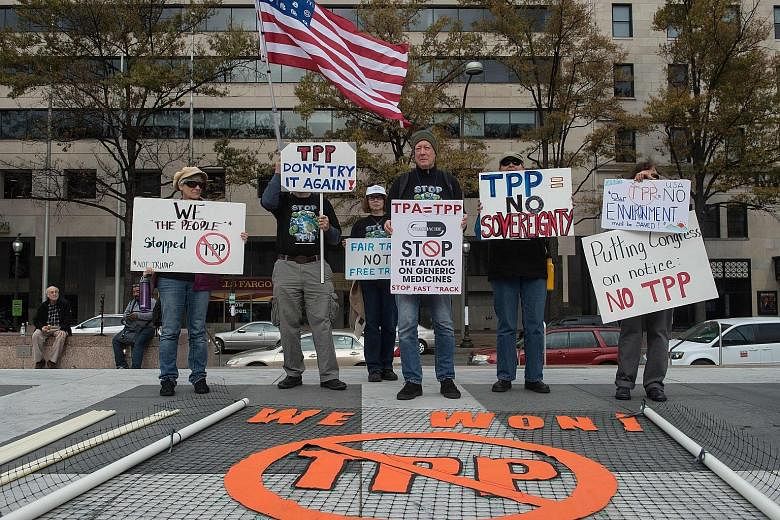WASHINGTON • United States President Donald Trump wasted no time tackling his campaign promise to reverse America's trade deficit: On Monday he signed a memorandum withdrawing from the Trans-Pacific Partnership (TPP), a move he promised would be a "great thing for the American worker". It dovetails with promises to impose tariffs on imports and crack down on American companies that manufacture overseas.
These steps make for great optics. But in economic terms, they're unlikely to move the needle. For the country to improve its trade balance, the President's going to have to do a lot more.
Ripping up trade deals won't achieve much. A new study by the non-partisan Congressional Budget Office found that estimates of the impact of "trade agreements on the US trade balance are very small and highly uncertain". Large tariffs are also unlikely to help. Yes, they'll lower imports, but will probably lower exports as well, both through a stronger dollar and retaliatory tariffs from our trading partners.
And it's hard to imagine much good emanating from Twitter-shaming China, or writing a cheque to the occasional factory to prevent it from outsourcing some of its jobs. Such measures are far too ad hoc to make a systemic difference.
So what would work?
Factors in the trade deficit include how much countries save and invest, the demand for traded goods and services, the relative competitiveness of the companies that produce them and, most important, exchange rates. As productive as they are, our manufacturers can't compete in foreign markets if exchange rates - the value of the dollar in terms of the currencies of our trading partners - are tilted against them.
A few years ago, Congress passed legislation that would allow the administration to impose duties on specific imports, like a particular grade of tyre, that were subsidised by exchange-rate manipulation. Though the Bill got large majorities in both houses, congressional leaders and the Obama administration killed the measure. Given today's climate around trade, such a Bill might well sail through Congress with bipartisan and leadership support.

That's a narrow approach to exchange-rate manipulation. A more sweeping way to level the playing field is a plan by the trade expert C. Fred Bergsten for "countervailing currency intervention". In simple terms, it would allow American economic authorities to purchase the currency of the manipulating country "to neutralise the impact of that country's own intervention in the foreign exchange markets". This idea hits a sweet spot: It could be more effective against currency manipulation and wouldn't interfere with trade flows and market-driven (versus orchestrated) moves in the dollar.
Next, countries have long used capital controls (for example, taxing foreign asset purchases; limits on currency purchases) to block unwanted inflows of money that made their currency rise. There's a risk here: Such inflows can be a valuable source of investment capital. But they can also increase the value of the dollar, worsen the trade deficit, and inflate credit bubbles. I wouldn't be at all surprised to see the Trump administration consider this route.
Another idea was introduced by Mr Warren Buffett years ago: Enforce balanced trade by providing exporters with "import certificates" worth the value of their exports. These could be traded to importing firms here or exporting firms abroad, in a version of cap-and-trade. (However, like Mr Trump's ideas for large tariffs, this scheme could generate retaliation - and thus have little impact on the trade deficit - and significant inflation.) As part of corporate tax reform, House Republicans are pushing a plan that subsidises exports and taxes imports. That certainly sounds as if it's doing something about the trade deficit, but that may not be the case: In response to complaints by companies that depend on cheap imports, like big retailers, proponents of the tax argue that it will increase the value of the dollar enough to offset the tax (that is, it will lower the price of imports). If they're right, the trade deficit won't shrink.
Finally, one reason our trade deals have little impact on our trade deficit is that they fail to include enforceable rules on things like currency manipulation and rules of origin. For example, Trump officials are already talking about useful changes to the North American Free Trade Agreement that would, among other things, ensure that only goods with a true majority of member-country content receive the benefits of the trade deal.
Making sure that any new trade agreements correct these omissions is a core part of establishing new rules of the road for international trade.
These are all big steps, but they may be worth it, given the global headwinds that are likely to drive up the deficit.
Because America is growing faster than other advanced economies, and because the Fed has increased interest rates while other central banks are holding them at zero or below, the value of the dollar has risen by over 20 per cent since mid-2014. That appreciation helped put the brakes on manufacturing jobs; employment fell 45,000 in the factory sector last year.
And the dollar's rise has accelerated since the election, up 3.5 per cent since Nov 7. If this trend continues unabated, we could lose over 200,000 more manufacturing jobs over the next few years, my estimates indicate.
In the 1970s and 80s, as trade deficits became persistent, politicians did not hesitate to respond through these sorts of interventions. Our obsession with unfettered markets has since precluded such efforts, even though our trading partners have not been nearly so constrained. Mr Trump's ascendancy may change that equation. The question is whether his administration will get it right.
NYTIMES
- The writer, a senior fellow at the Centre on Budget and Policy Priorities, was the economic adviser to Vice-President Joseph R. Biden Jr from 2009 to 2011.

